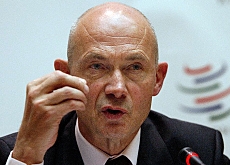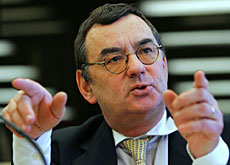Swiss call for WTO flexibility on agriculture

Switzerland has criticised richer agricultural export countries ahead of the World Trade Conference ministerial summit in December.
Senior Swiss trade official Luzius Wasescha said a refusal not to take into account differences between countries during negotiations on agriculture could cause problems.
Wasescha was speaking on Friday after the latest round of negotiations at the World Trade Organisation (WTO) aimed at reforming agricultural policy.
“The success of the ministerial conference in Hong Kong depends on the desire of the principle actors to take account of the different realities during the process. Otherwise they could be surprised by some of the reactions,” he said.
Officials are hoping that a WTO treaty on cutting subsidies, tariffs and other barriers to global commerce – to which Switzerland has signed up – will finally be hammered out at the Hong Kong meeting.
The current round of treaty talks was launched in Doha, Qatar in 2001. The original plan was to create a new global trade treaty by the end of 2004, but a WTO conference in 2003 collapsed amid bickering over investment rules between rich and poor members, as well as differences on agriculture.
Geneva chance
Wasescha said that there was still a chance that some agreements could be made at a series of July meetings at the WTO headquarters in Geneva. These are aimed at paving the way for the December meeting.
He had harsh words for the larger agricultural exporters who he said were on the “offensive”.
“The opening of the agricultural markets in their favour could have negative effects on developing countries,” he said, “This would be a strange result for development policy.”
For their part, the G10 group of large import countries, which is currently headed by Switzerland and includes Japan and Israel, were being called upon to make too many concessions with little in return, he said.
Meanwhile, too little progress was being made on the industrial products and liberalisation of services dossiers compared with agricultural policy, added Wasescha. Moves to uniformly lower customs tariffs also came in for strong criticism.
Phasing out
Last August Switzerland signed up to an international agreement with the WTO, which foresees the gradual phasing out of protective tariffs and subsidies for farmers.
But a WTO report in December criticised Swiss agricultural policy as being still too protectionist, saying that state support for farming was high.
The government replied that its agriculture reform policy was an ongoing process and showed the country’s determination to benefit from new export possibilities.
The country’s agricultural community has criticised the WTO rules. Farmers are already having a tough time, with 2.5 per cent of farms disappearing between 1999-2003 and many farmers having to diversify to survive.
swissinfo with agencies
The WTO has 148 members.
The next ministerial conference of the WTO is in Hong Kong from December 13-18.
Switzerland is the 11th largest importer of agricultural products.
The G10 countries represent 3.5% of the world’s population but import 14% of the world’s exports.
It is made up of Switzerland, Japan, South Korea, Taiwan, Liechtenstein, Israel, Norway, Iceland and Mauritius.
Bulgaria, which is due to join the European Union, has pulled out.

In compliance with the JTI standards
More: SWI swissinfo.ch certified by the Journalism Trust Initiative











You can find an overview of ongoing debates with our journalists here . Please join us!
If you want to start a conversation about a topic raised in this article or want to report factual errors, email us at english@swissinfo.ch.